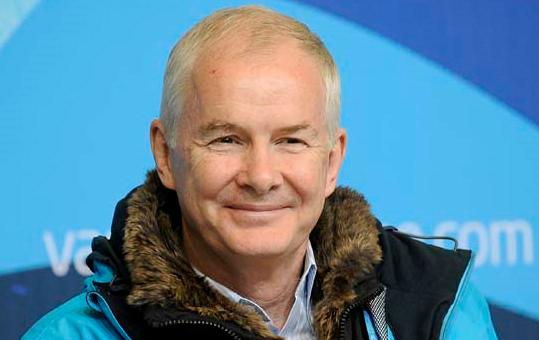
A contestant races at Beijing's Nanshan Ski Resort in February, 2016. (Photo/Chinanews.com)
(ECNS) – With only six years to go before the 2022 Winter Olympic Games, Beijing may glean from Vancouver to achieve a "fantastic, extraordinary and excellent" event.
John Furlong, CEO of the 2010 Vancouver Winter Olympics and Winter Paralympics Games, led a delegation to China from March 18 to 23 to supply some know-how to Chinese organizers.
The 2022 Winter games will be co-hosted by Beijing and Zhangjiakou, a city in Hebei province and a three-hour drive from the capital.
When Beijing launched the organizing committee for the 2022 Winter Games last December, senior leaders stressed a "green" Olympics, a heightened level of city management, broader appeal of winter sports in China, and stricter budget control.
"There's already a high-level of awareness of what's gonna happen in Beijing and Zhangjiakou," Furlong told ECNS.cn in Beijing after a trip to Zhangjiakou. "The organizers are looking for ways to learn and understand the best examples to follow."
The 2010 Vancouver Winter Games are widely acclaimed as one of the most successful by the international community, with an impressively low budget of $6.4 billion (the 2014 Sochi Games cost $51 billion), great results, and rich legacy.
"The Vancouver Games were held during the global economic meltdown. Instead of going to the government for money, we spotted the opportunity to show the best we could do," Furlong said. "We looked at our situation and asked ourselves how to do things differently by using existing structures, reducing size of the venues and creating celebration areas outside."
Furlong also said that the sustainability of the venues is what concerns him most, and that building massive venues and letting them collect dust is an outdated model.
He gave an example of how the Richmond Oval (a venue for speed skating during the Vancouver Olympics) in British Columbia manages to stay afloat and be part of Canadian life since the Games.
"When people wake up in the morning, they have their breakfast and go over to the Oval. They row boats there, run on the track, play basketball, play hockey or climb the wall. When young children walk into the door, they feel like they are in the middle of an Olympic Games, and that's really inspiring," Furlong said.
He added that the Vancouver organizers didn't build the venues just for the 2010 Games.
"They designed venues for use in 2030, and then thought about how to put an Olympic Games in them."

When bidding for the 2022 Winter Games, China raised an ambitious plan to encourage 300 million people in the country to participate in winter sports during the process.
China is seeing an enormous growth in winter sports. An industry white paper shows a total of 12.5 million people hit the slopes nationwide in 2015, up 21.4 percent from 2014. With 23 resorts, Beijing attracted 1.7 million skiing enthusiasts in 2015.
Furlong said the market will further explode due to the Winter Games, but to deliver that promise, China needs to start with winter sports that it's good at.
"If an athlete wins a gold medal, children would want to be that athlete and do what that person is doing, such as Lionel Messi in soccer," Furlong said. "Potential champions are a good way to encourage public involvement."
Beijing and its surrounding areas have been troubled with smog, but Furlong said that with new technology, determined leadership, and countries that can help, he's confident that China will show the world that good things can happen.
He added that the scenery in Zhangjiakou is "pristine and beautiful" when the sky is blue.
But hosting the Olympic Games doesn't mean tourists will follow, he said.
"Vancouver's tourism is up by 15 percent since the Games, and the key is to tell a good story," Furlong said. "China needs to keep talking about the Games, and tell the world how different it is from any other country."
Among all the challenges China may need to address in its preparations, the biggest is the one that they don't know about, Furlong said.
"Before the Vancouver Games, data showed that there would be too much snow. So we prepared for too much snow. But we had no snow. We had to find and move the snow from elsewhere to cover the mountains."
"The most challenging part is bringing the uncontrollable things under control," he said.
Furlong said Vancouver is happy to help China get there with "fresh and original ideas." The group will pay more visits to China in the future and hopefully create a collaboration with Chinese organizers.
"It's an opportunity for Canada and China to work together," Furlong said. "One thing I'm sure of is that based on the example of the 2008 Beijing Games, the result will be spectacular."


















































